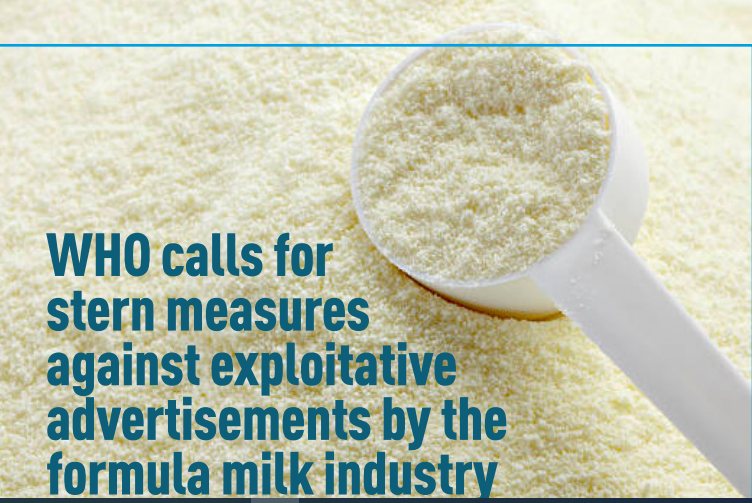WHO calls for stern measures against exploitative advertisements by the formula milk industry.

The World Health Organisation (WHO) has decried the surge in exploitative marketing tactics used by the formula milk industry and called for a clamp down on the industry.
In a statement on 6th February 2023, WHO faulted the vast economic and political power of the big formula milk companies, as well as serious public policy failures as some of the reasons that prevent millions of women from breastfeeding their children.
Further, WHO warned that any industry interference with counterfactual information would lead to great harm to mothers and children.
After an investigative report which was done in the 1970s showing that the World Health Assembly developed the International Code of Marketing of Breast-milk Substitutes (the Code) in 1981 and several subsequent resolutions, WHO’s action was spurred.
However, intensive marketing of infant formula continues largely unabated, with sales from these products now approaching US$ 55 billion a year.
Why breast milk?
Breastfeeding has long been recommended by scientists for being far more superior in terms of nutritional value for the infants compared to the use of formula milk. Some of the benefits include helping children survive and develop to their full potential, providing energy and nutrients, reducing infection risks and lowering rates of obesity and chronic diseases in later life. In fact, mothers are advised to ensure that they breastfeed exclusively during the first six months after giving birth. Yet, globally, only around 1 in 2 newborns are put to the breast within the first hour of life while fewer than half of infants under 6 months are exclusively breastfed, as per WHO recommendations.
Research published since the 2016 Lancet breastfeeding Series1 has strengthened the evidence for the importance of interactions between mother and baby during breastfeeding. For example, suckling the breast releases oxytocin, prolactin, and other metabolites that foster mother–child bonding and reduce physiological stress for both.
Hormones in breast milk stimulate appropriate infant appetite and sleep development, and hormonal, physiological, and metabolic changes during breastfeeding support the mother’s lifelong health in various ways. During breastfeeding, the immune systems of mothers and infants communicate with each other beyond passive immunity, and mothers transmit elements of their microbiota to their children through breastmilk.
While highlighting the immense benefits that breast milk has for the infant’s health, the Lancet series recommended much greater support for breastfeeding within healthcare and social protection systems – including guaranteeing sufficient paid maternity leave.
Further, the findings by the Lancet shows that currently, around 650 million women lack adequate maternity protections. Misleading marketing claims and strategic lobbying from the dairy and formula milk industries further add to the challenges parents face, by increasing anxiety around breastfeeding and infant care.
“This new research highlights the vast economic and political power of the big formula milk companies, as well as serious public policy failures that prevent millions of women from breastfeeding their children,” said Professor Nigel Rollins, Scientist at WHO and author of a paper on formula milk marketing.
“Actions are needed across different areas of society to better support mothers to breastfeed for as long as they want, alongside efforts to tackle exploitative formula milk marketing once and for all.”
Further, the first paper in the Lancet series shows how misleading marketing claims directly exploit parental anxieties around normal infant behaviours, suggesting that commercial milk products alleviate fussiness or crying, for instance, that they help with colic, or prolong night-time sleep. The authors stress that, when mothers are appropriately supported, such parental concerns can be managed successfully with exclusive breastfeeding.
“The formula milk industry uses poor science to suggest, with little supporting evidence, that their products are solutions to common infant health and developmental challenges,” said Professor Linda Richter from the University of the Witwatersrand, South Africa.
“This marketing technique clearly violates the 1981 Code, which says labels should not idealise the use of formula to sell more product.
Experts have therefore called on the governments to promptly tackle misinformation and embrace the breastfeeding Code without further delay to ensure that manufacturers making misleading claims about their products are held to account.

